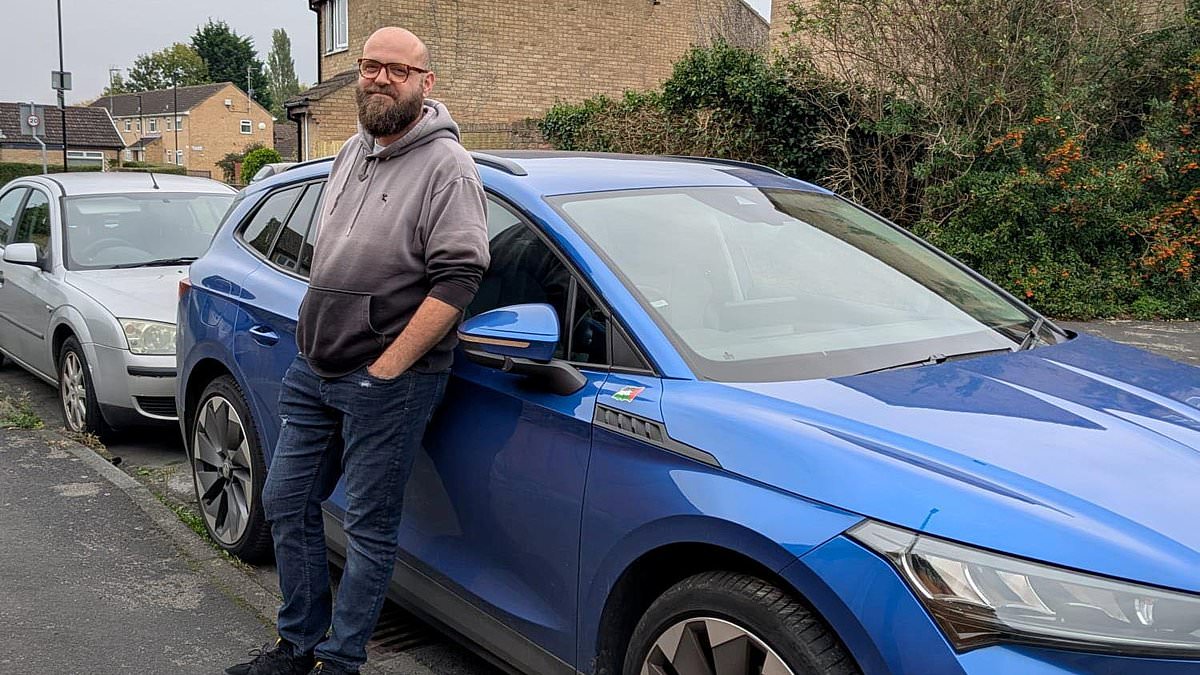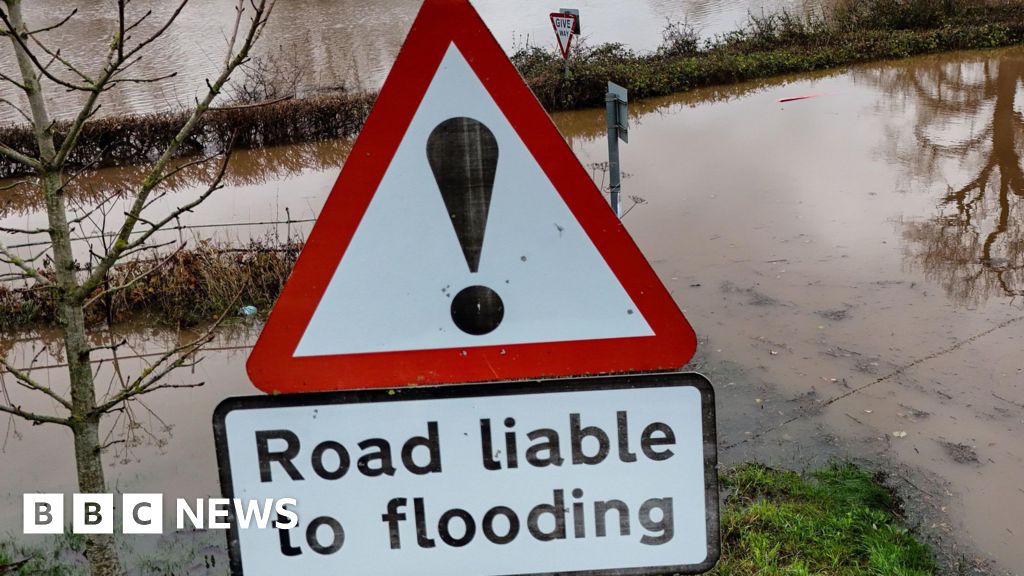Copyright dailymail

I bought an EV to save money but it's costing me HUNDREDS more than running a diesel car - here's why Kristian Lewin-Petrov, 45, says his local council is blocking him from savings By ROB HULL, MOTORING EDITOR Updated: 06:00 GMT, 30 October 2025 An eco-conscious motorist who recently replaced his diesel car with an EV hoping it would reduce his impact on the environment as well as lower his bills says he is being blocked from potential savings by his local council. Kristian Lewin-Petrov, 45, from York, does not have a driveway at his home but purchased an electric Skoda Enyaq SUV believing he could run a charging cable from his house to the roadside. But he says his local council has refused him having a charging cable gully recessed into the footpath outside his home on health and safety grounds, forcing him to instead use the public charging network, which is typically twice as expensive as plugging in at home. Being pushed to use more expensive public charging has cost £100 more than filling up his old diesel car to cover the same mileage over three weeks, he said. Mr Lewin-Petrov's complaints come as statistics show a significant electric vehicle ownership imbalance in Britain based on whether people have off-street parking or not - an issue that threatens to derail the Government's Net Zero ambitions. On Wednesday, ministers announced new plans to make electric cars accessible to more households in Britain to tackle the problem head on. This includes removing the need for EV owners to apply for planning permission to run a charging cable gully through pavements. Eco-conscious Kristian Lewin-Petrov, 45, from York, says he's being blocked from the financial benefits of running an electric car because his local council has refused his request to have a charging cable gully put through the pavement outside his home According to the Department for Transport's EV Driver Tracker report, nine in ten (91 per cent) of current electric car owners in the UK have access to charging at home. And three quarters of them have a driveway, garage or dedicated parking space where they have an EV-charging wallbox installed. Homeowners without driveways, which accounts for around 10 million flats and terraced houses, are typically unable to have a home charger fitted at their property. As a result, these motorists are forced to rely on the public network of chargers, which are double - if not three times - more expensive to use than a domestic tariff. Mr Lewin-Petrov says that without the cable gully, he is unable to plug into his domestic energy tariff to charge his car because he does not have a driveway Being left with no other option but to use the more expensive public charging network, he's spent £100 more in 3 weeks than he did fuelling his old diesel car to cover the same mileage According to the latest AA Recharge Report for September, the average cost per mile to charge an EV at home using a domestic tariff is 5.88p per mile. However, for those without off-road parking facilities, the cheapest option - using a public slow charger offering speeds of up to 8kW - is 11.3p per mile, almost double that of plugging in at home. And for EV owners without driveways who can access a 'fast' charger (9kW to 49kW), the average cost per mile increases to 13.79p. Most expensive of all are ultra-rapid chargers - 150kW-plus devices typically found at motorway service stations - at 17.63p, which is more than three times the cost of charging domestically. The cost deficit is partly due to higher taxation on public charging at 20 per cent, compared to just 5 per cent VAT levied on those who can plug in at home. The AA's calculations show that filling up with petrol and diesel is a more affordable option than having to rely on the public EV charging network. Even with a monthly increase in fuel prices last month, the pence per mile cost for a petrol car is 11.82p, while diesel is cheaper at 10.18p. Mr Lewin-Petrov is seeing the higher cost of running an EV first hand, saying he's spent almost £200 recharging his Skoda using public devices having been blocked from installing a cross-pavement charging solution outside his home. He said: 'I live in a terraced home without a driveway. 'I approached the council about a new technology that would allow me to charge my car from home – saving a considerable amount of money and time.' EV RUNNING COSTS DEPENDING ON WHETHER YOU CHARGE AT HOME OR NOT Charge Type *Sept avg price (p/kWh) **Cost to add 80% charge Pence per mile (p/mile) Domestic (up to 7kW) Public slow (up to 8kW) Public fast (8-49kW) Public rapid (50-149kW) Public ultra-rapid (150kW+) Sept avg price (ppl) ***Cost to 80% fill a 32l fuel tank Pence per mile (p/mile) AA Recharge Report September*Sept avg price based on pay as you go option without connection fee as of 26 September 2025 (subscriptions are available for all charge point speeds which can unlock a cheaper p/kWh, however rates vary across provider) *Cost to add 80% to a Vauxhall e-Corsa, 50kW, with a WLTP range of 221 miles. Adding 80% range equates to 178 miles of range **Calculation for petrol based on Vauxhall Corsa 1.2l (100PS) petrol returning 52.3mpg. Calculation for diesel based on VW Golf 2.0l (115PS) diesel returning 64.2mpg. 80% fill equivalent to adding 32 lites to a 40 litre tank (VW Golf tank size is bigger but 40l used for comparison purposes) Kerbo Charge is one UK start-up that has struck a deal with councils to fit the charging cable gullies outside homes without off-street parking Cross-pavement charging gullies are widely considered by EV experts the best solution to tackle the issue. It allows a driver to fit a wallbox to the side of their building, tapping into their domestic energy tariff. The charging cable is then fed to the roadside through the footpath. This requires a shallow channel to be recessed into the pavement to safely run the cable across a footpath without causing a trip hazard for pedestrians. However, to dig into a public footpath requires consent from local councils, and in some instances planning permission. But while some councils have given then the green light, Mr Lewin-Petrov has been denied. 'The gullies come with a self-closing lid, which is completely safe for pedestrians,' he explained. 'The charging channels have been approved in 30 other local authorities, yet not in York.' City of York Council said it has yet to approve the cross-pavement charging solution for EV owners without driveways as a review raised various potential problems with the gullies Tom Horner, the council's head of active and sustainable transport, said advice has highlighted 'electrical safety compliance and road safety implications' He said he'd happily pay for the installation and upkeep himself, but officials have ruled out the idea. He said: 'We are told the channels are 'insurmountable' health and safety issues. 'One has to wonder if the areas that have adopted the technology are now besieged by residents tripping over cables in a slapstick apocalypse. I suspect not. 'This stance has forced residents without a driveway, like myself, to rely on a public network with charging rates that make the virtuous choice of driving an EV as expensive, or in my case, more so, than running a traditional petrol or diesel car.' Electric vehicles are '£350 a year' cheaper to run than petrol cars - but only if you can charge at home Mr Lewin-Petrov added: 'This is a masterpiece of unintended consequences that directly contradicts the city's clean air ambitions. 'Perhaps the question for the City of York Council isn't, "Is this 100 per cent safe according to a document from 1983?" but rather, 'What is the cost of not doing this?'.' In response, Tom Horner, the council's head of active and sustainable transport, said that various products have been under review since 2020 as the authority assesses their suitability. But he said advice has 'highlighted a variety of issues' including 'electrical safety compliance and road safety implications'. Mr Horner added that the council would continue to keep products 'under review as technology progresses' and was open to solutions which overcome the authority's concerns. Government to launch consultation to remove charging cable gully red tape The practical and financial constraints being experienced by Mr Lewin-Petrov explains why EVs are proving far less appealing to drivers in properties without off-street parking. With approximately 40 per cent of UK households not having driveways, this represents a considerable proportion of licence holders who will see little financial benefit from going electric. If this remains the case, it could create major implications for a Government striving to achieve Net Zero green targets. To tackle the problem and reduce the disparity, the Government has confirmed it will launch a consultation into allowing 'cross-pavement charge points' to be installed under permitted development and so not requiring planning consent. Doing so would dramatically speed up applications and save EV drivers around £250 in application fees. The Government says it will also work with Ofgem to ensure public costs are fair and strengthen protections against landowners overcharging tenants for home charging above the market rate. Ministers will 'shortly' launch a consultation on the package, enabling industry to inform how the reforms can best be implemented. Transport secretary Heidi Alexander said it will 'improve infrastructure for the EV revolution, increase charging points across the country, and open up affordable home charging to thousands more households'. According to the DfT's EV Driver Tracker report, 91% of current electric car owners in the UK have access to charging at home. For the 40% of households without a driveway, owning an EV is still not practical or cost-effective - and this threatens Net Zero targets RELATED ARTICLES Electric vehicle charging point installation stalls Eco campaigners turn on GREEN cars calling the electrified... Share this article HOW THIS IS MONEY CAN HELP 10 tips on how to get cheaper car insurance Transport minister Lord Hendy of Richmond Hill first revealed the plan for the consultation to make amendments to the Planning and Infrastructure Bill in a response given in Parliament last week. Liberal Democrat Baroness Pidgeon said: 'Up to 40 per cent of UK households do not have access to off-street parking. They therefore rely on public charge points, which can cost up to 10 times more than charging at home. 'Cross-pavement solutions have real potential to help to tackle this challenge, but the current costs of installation can be around £3,000 and it can take 12 to 15 months for a decision from a local authority. 'Only this month in Northern Ireland, residents can now apply for cross-pavement electric vehicle charging channels. 'Through just a simple online form, residents can apply for the channels that would allow residents with electric vehicles to reduce charging costs there from £25 at a typical charge point to just £3. 'We need to make it as simple and easy to access in the rest of the country too.' Lord Henry replied: 'It is important that a consultation is undertaken to consider the impacts of such a permitted development right and to develop appropriate mitigations should the proposal be taken forward.' EV charging cable theft: The rise of organised crime that could hit the brakes on EV uptake Subject to the outcome of the consultation, he suggested changes could be made quickly under existing legislation 'to simplify cross-pavement charging solutions by granting permitted development rights'. However, a decision would also need to be made regarding making changes to street permits required to dig up footpaths to fit the gullies. 'Section 50 licences provide local authorities with the statutory means to supervise and regulate third-party works on public highways, ensuring that standards of safety, quality and responsibility are upheld,' Lord Henry added. 'This oversight is especially important in developing areas such as cross-pavement charging.' He went on: 'While the public charge point market is now relatively mature, with over 86,000 installations in the UK, the cross-pavement solution space remains nascent with just a few hundred installations to date. 'Given this disparity, it is appropriate that Section 50 licences continue to be used for cross-pavement installations. 'As my department intends to consult on expanded permitted development rights, it would also not be appropriate to remove the need for Section 50 licences at this time, as that would remove those key checks and balances for local authorities.' He added: 'However, a delivery model that is already available to local authorities is to use their own highways teams. 'In doing so, they can already access street works permits to directly install cross-pavement solutions and avoid the need for a Section 50 licence. 'This approach gives local authorities power to make delivery decisions at a local level, while maintaining oversight and the choice of delivery model.' Is it illegal to run a charging cable across the pavement? If someone trips and falls on an electric car's charging cable strewn across the pavement, who is liable? The practice of running a lead across the pavement has been banned by some councils, but not all. One authority that doesn't allow it is Bristol City Council, which states on its website: 'You cannot trail a cable over the pavement to charge your car. 'A power cable running across the pavement, even if covered or inserted into a gully, is a trip hazard or access issue for disabled and vulnerable groups. 'If someone is injured, you as the homeowner or occupier could be liable. 'We have a legal duty to ensure the safety and use of the highway in accordance with the Highways Act 1980 and the Health and Safety at Work Act 1974. 'In accordance with the Electrical Wiring Regulations, all electrical equipment must also be certified and regularly tested as electrically safe. You cannot install your own charge point on the pavement outside your home. Only the council can install equipment on the pavement or the street. 'You cannot install a charging cable gully or channel into the pavement outside your home because this is a potential trip hazard.' Others are more lenient and allow EV owners to do this, though with some guidelines to follow. Some state that a cable should only be placed over the footway when the vehicle is charging and should always be removed when not in use. They also recommend that those living on particularly busy streets use raised plastic cable protectors, which are commonly used on construction sites. A protector, up to three metres in length, usually costs around £20. The Local Government Association says drivers should consult their local authority's website when considering how best to charge their electric vehicle. When we looked into the legal ramifications of running charging leads over the footpath in 2020, an LGA spokesperson told the Daily Mail and This is Money that if someone was to injure themselves tripping over a charging cable across a pavement, the owner could potentially be liable - though a personal injury lawyer and motor insurer claims this might not be the case. Some councils recommend that charging cables should only be across the footpath when the vehicle is plugged in. Many recommend 'cable protectors' (as seen in this picture), which are commonly used on building sites and cost around £20. Others have banned the practice entirely A personal injury lawyer's perspective... Kathryn Hart, a partner at personal injury law experts Lime Solicitors, explains the process for an individual who suffers injury after tripping on a charging lead across the footpath. 'Your accident probably happened on a public highway so you cannot claim the negligent person is the occupier of that highway,' she explained. 'You will need to argue that in common law negligence they owed you a duty of care, that they have breached that duty and that it was reasonably foreseeable that the injury would occur and that you have been injured.' This makes the claim scenario the same as it would be if an individual needed to prove that they had actually been knocked down by the owner of the EV, with the claim then made against their insurer. 'Will that insurance apply in this sort of case? What you need to prove is that the injury arose out of the use of the insured vehicle on the road,' Kathryn says. 'If the Court accepts that charging the vehicle is using it then the insurers would have to cover it.' However, she warns: 'Insurers are not usually quick to accept responsibility if they think they can avoid it. I think they will fight it. 'The problem with a claim against the car owner is that if the insurance doesn't cover them then they are probably not worth suing.' What car insurers think... With personal injury lawyers firmly placing the ball for these cases in an insurer's court, the Daily Mail and This is Money spoke to one of the major electric vehicle insurers, LV General Insurance, to get their perspective. Incredibly, EV policies now have to cover customers for trips or falls on their own charging cables. Recently the law has changed as the result of a court ruling where 'use' of a vehicle has been defined. Charging an EV is deemed as 'use' or using the vehicle, much like you are using a car if you are refuelling it with petrol, even if you aren't physically driving it. But what if someone else trips over the charging lead? A spokesman for LV told us: 'If someone was to trip or fall over a charging cable and our customer was found legally responsible or negligent our policy would cover it under 'liability to other people'. 'With these type of claims, our customer would have to be found negligent in a court of law and there would be other things to consider too, such as the pedestrian perhaps not paying attention to where they were walking because, for example, they were looking at their phone - there could likely be an element of contributory negligence on their part.' It also added that the injury would need to be 'pretty severe to initiate a claim', and tripping over on a pavement may not necessarily result in a life threatening or altering injury in most cases. Save on services and MOTs - and keep track of your car's documents The This is Money Motoring Club is designed to make car ownership cheaper and simpler for This is Money and Daily Mail readers. Powered by MotorEasy it's the place to keep on top of tax, MOTs and servicing - and manage important documents and receipts that keep your car’s value. You can also save money on maintenance and repairs. All new members will receive a one-off gift of £20 in reward vouchers to spend. You can use this for a raft of motoring discounts, including getting £20 off an MOT with one of MotorEasy's listed providers. Share or comment on this article: I bought an EV to save money but it's costing me HUNDREDS more than running a diesel car - here's why Add comment



